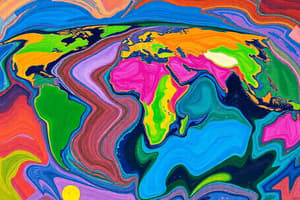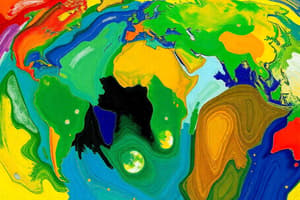Podcast
Questions and Answers
What is the primary difference between absolute location and relative location?
What is the primary difference between absolute location and relative location?
- Absolute location can change over time, while relative location remains constant.
- Absolute location refers to a place's cultural context, while relative location refers to physical features.
- Absolute location uses latitude and longitude, whereas relative location uses nearby landmarks. (correct)
- Absolute location is determined by human perception, but relative location is fixed.
Which of the following best describes 'Movement' in geography?
Which of the following best describes 'Movement' in geography?
- The geographical boundaries between different regions.
- The human mobilization and reasons for migration from one location to another. (correct)
- The physical changes in the earth's crust over millions of years.
- The representation of earth's physical characteristics on maps.
What characterizes the regions in geography?
What characterizes the regions in geography?
- Regions are solely based on population density.
- Regions must always be politically defined areas.
- Regions do not have specific boundaries or characteristics.
- Regions share common human or physical characteristics. (correct)
What geological feature is formed by diverging tectonic plates?
What geological feature is formed by diverging tectonic plates?
Which process involves the breaking down of rock into smaller pieces?
Which process involves the breaking down of rock into smaller pieces?
What is the primary distinction between weather and climate?
What is the primary distinction between weather and climate?
What is the result of converging tectonic plates?
What is the result of converging tectonic plates?
What major geological event is associated with the movement of tectonic plates?
What major geological event is associated with the movement of tectonic plates?
What phenomenon occurs when the sun appears directly overhead at specific latitudes?
What phenomenon occurs when the sun appears directly overhead at specific latitudes?
In which climate region would you typically find a tundra biome?
In which climate region would you typically find a tundra biome?
What is the main factor affecting population growth in a geographic area?
What is the main factor affecting population growth in a geographic area?
Which of the following accurately describes the tropical zones?
Which of the following accurately describes the tropical zones?
Which type of vegetation is adapted to survive long, cold winters?
Which type of vegetation is adapted to survive long, cold winters?
What term describes the impact of human activity on the physical environment?
What term describes the impact of human activity on the physical environment?
Which climate region includes both humid subtropical and Mediterranean climates?
Which climate region includes both humid subtropical and Mediterranean climates?
Which of the following best defines nonmaterial culture?
Which of the following best defines nonmaterial culture?
Flashcards
Absolute Location
Absolute Location
The exact location of a place using latitude and longitude coordinates, like a specific address.
Relative Location
Relative Location
The position of a place relative to other places, like saying "next to the park" or "south of the river."
Place
Place
The physical and human aspects of a place, including its features, culture, and history.
Movement
Movement
Signup and view all the flashcards
Regions
Regions
Signup and view all the flashcards
Human-Environment Interaction
Human-Environment Interaction
Signup and view all the flashcards
Weather
Weather
Signup and view all the flashcards
Climate
Climate
Signup and view all the flashcards
Earth's Rotation
Earth's Rotation
Signup and view all the flashcards
Earth's Revolution
Earth's Revolution
Signup and view all the flashcards
Earth's Tilt
Earth's Tilt
Signup and view all the flashcards
Solstices
Solstices
Signup and view all the flashcards
Equinoxes
Equinoxes
Signup and view all the flashcards
Tropical Zones
Tropical Zones
Signup and view all the flashcards
Temperate Zones
Temperate Zones
Signup and view all the flashcards
Polar Zones
Polar Zones
Signup and view all the flashcards
Study Notes
Exam Format
- 70% Multiple Choice
- 20% Matching
- 10% Short Answer
General Geography
- Five Themes of Geography:
- Location (absolute and relative)
- Place (cultural and physical context)
- Movement (human mobilization)
- Regions (shared characteristics)
- Human-Environment Interaction
- Earth's Surface:
- 70% water, 7 continents, 4 oceans
- Major landforms: mountains, hills, plateaus, plains
- Earth's Crust:
- Constantly changing (moving, bending, breaking)
- Folds (rock layers bend)
- Faults (breaks in the crust)
- Tectonic plates (movement causes volcanoes, earthquakes, tsunamis)
- Continental drift (Pangaea, plates moving apart)
- Diverging plates (rift valleys, volcanic action, earthquakes)
- Converging plates (mountains, volcanoes)
- Sliding plates (faults, earthquakes)
- Ring of Fire (volcanoes around Pacific Ocean)
- Weathering:
- Mechanical weathering (physical breakdown)
- Chemical weathering (alters rock's composition)
Weather and Climate
- Weather: Short-term atmospheric conditions
- Atmosphere: Layered gases surrounding Earth
- Climate: Long-term weather patterns
- Earth's Movements:
- Rotation (24 hours)
- Revolution (365 ¼ days)
- Tilt (affects seasons)
- Solstices (sun directly overhead)
- Equinoxes (day and night equal)
- Climate Zones:
- Tropical (low latitudes)
- Temperate (mid-latitudes)
- Polar (high latitudes)
- Weather Components:
- Humidity (water vapor)
- Precipitation (water falling from atmosphere)
Climate Regions
- Tropical (wet, wet and dry)
- Dry (semiarid, arid)
- Moderate (Mediterranean, humid subtropical, marine west coast)
- Continental (humid continental, subarctic)
- Polar (tundra, ice cap)
Changing Climates
- Greenhouse effect (increased CO2, global warming)
Vegetation Regions
- Plant Communities: Plants interact
- Biomes: Regions with suitable plants and animals
- Tropical rainforests (near equator)
- Mid-latitude forests (deciduous and coniferous)
- Tropical grasslands (savannas)
- Temperate grasslands (prairies, steppes)
- Deserts
- Tundra (cold, specialized plants)
Human Geography
- Population Distribution: Uneven distribution, urban vs. rural
- Population Growth Factors:
- Geographic factors
- Birth and death rates
- Population flow (immigration/emigration)
- People & Environment: Adapting to and altering environments; living in favorable areas (fertile land, water).
- Two-thirds water, one-half land unusable.
Culture
- Population & Culture (differences): Culture reflects objects and ideas
- Material Culture: Technology, architecture, clothing
- Nonmaterial Culture: Religion, language, behavior
- Social Organization: Structures of society
Studying That Suits You
Use AI to generate personalized quizzes and flashcards to suit your learning preferences.



